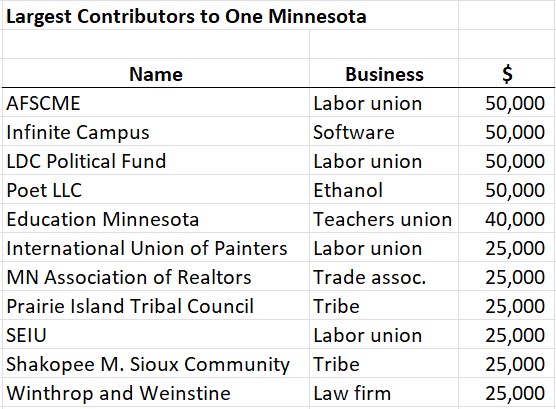Corporate money in politics, the inaugural exception
Corporations are prohibited from donating money directly to a political candidate. An exception to the rule involves the candidate-adjacent inaugural committees.
We are just eight months away from the next inauguration in Minnesota. Let’s take a look at how these festivities are financed. Gov. Tim Walz and his Lt. Gov. Peggy Flanagan took office in January 2019 amid the customary hoopla. As the Minneapolis Star Tribune described the event,
The cost of the parties will be covered by donations to the One Minnesota Inaugural Committee, a political nonprofit created to fund the inauguration celebrations. A full list of donors was not immediately available, but an event program listed dozens of major companies and labor unions as sponsors, including Best Buy, the Minnesota Vikings and SEIU Healthcare Minnesota.
There is no reason to believe that this event was handled differently than any of Walz’s predecessors, be they Democratic, Republican, or Independent. Corporations can donate to political parties, to political action committees, and to “dark money” nonprofits. They cannot donate directly to individual candidates. The inaugural committee is an exception that appears to fall in between.
The One Minnesota Inaugural Committee was formed after the 2018 election and took in more than $700,000.

The donor list is public and it’s a veritable who’s who of corporate Minnesota. Best Buy is there, along with many of the state’s Fortune 500 companies. Labor unions are listed as well as lobbyists. The Vikings are there, along with the Twins and the Timberwolves. Here are the largest donors,

The point being that all of these contributors will have business in front of the executive branch for the next four years. The AFSCME public employees union had its contract negotiated with Walz’s budget commissioner, and the new contract added a new state holiday.
The Education Minnesota teachers union is poised to cash in, again, with public schools getting an additional $1 billion in a supplemental state budget this month.
Poet is a large ethanol company based in South Dakota. Walz is seeking a Federal waiver that would allow for additional sales of the fuel in Minnesota.
It doesn’t end there. All of the state’s biggest energy utilities–Xcel, CenterPoint, Minnesota Power, Otter Tail Power–donated to the committee. These corporations will have their prices set by commissioners appointed by Gov. Walz. Pfizer gave $5,000.
An affiliated committee formed to fund the transition effort also accepted private donations. In the end, the inaugural committee spent a little over a $500,000 and still has $177,000 left over.
It’s not clear who owns that money or what will be done with it. Neither Walz nor Flanagan served on the board of the nonprofit.